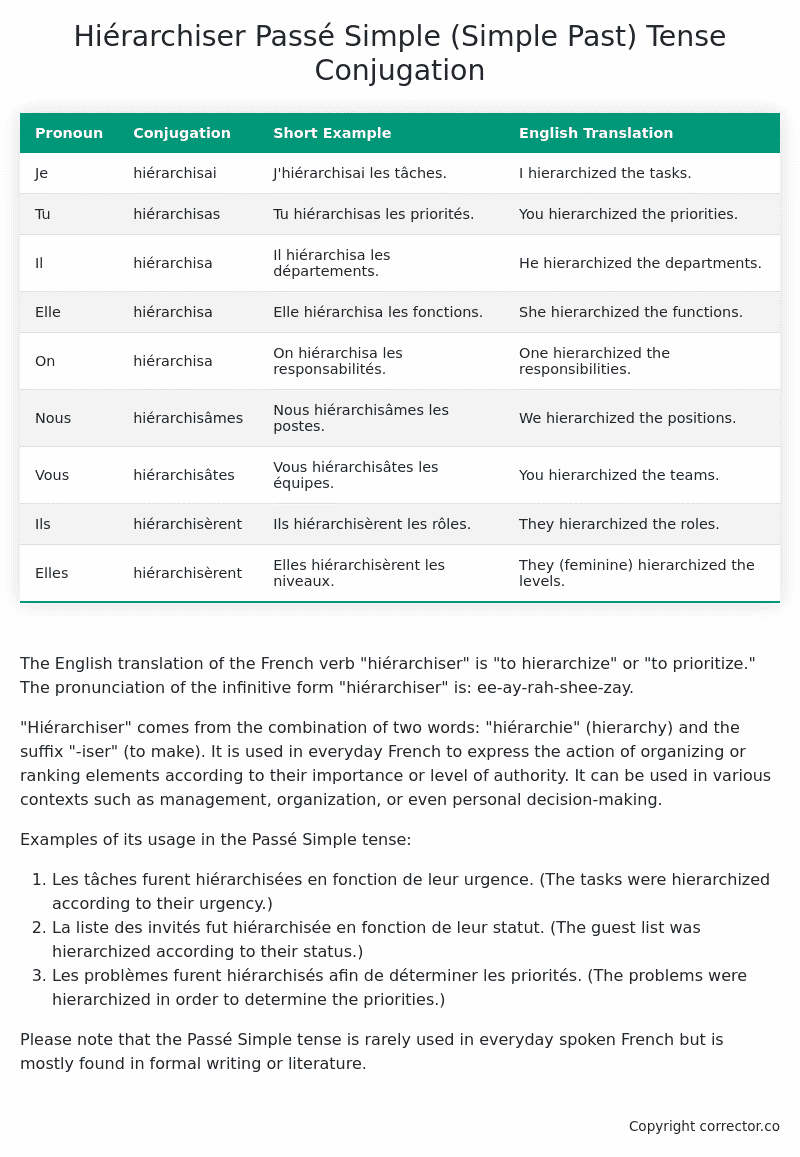Passé Simple (Simple Past) Tense Conjugation of the French Verb hiérarchiser
Introduction to the verb hiérarchiser
The English translation of the French verb “hiérarchiser” is “to hierarchize” or “to prioritize.” The pronunciation of the infinitive form “hiérarchiser” is: ee-ay-rah-shee-zay.
“Hiérarchiser” comes from the combination of two words: “hiérarchie” (hierarchy) and the suffix “-iser” (to make). It is used in everyday French to express the action of organizing or ranking elements according to their importance or level of authority. It can be used in various contexts such as management, organization, or even personal decision-making.
Examples of its usage in the Passé Simple tense:
- Les tâches furent hiérarchisées en fonction de leur urgence.
(The tasks were hierarchized according to their urgency.) - La liste des invités fut hiérarchisée en fonction de leur statut.
(The guest list was hierarchized according to their status.) - Les problèmes furent hiérarchisés afin de déterminer les priorités.
(The problems were hierarchized in order to determine the priorities.)
Please note that the Passé Simple tense is rarely used in everyday spoken French but is mostly found in formal writing or literature.
Table of the Passé Simple (Simple Past) Tense Conjugation of hiérarchiser
| Pronoun | Conjugation | Short Example | English Translation |
|---|---|---|---|
| Je | hiérarchisai | J’hiérarchisai les tâches. | I hierarchized the tasks. |
| Tu | hiérarchisas | Tu hiérarchisas les priorités. | You hierarchized the priorities. |
| Il | hiérarchisa | Il hiérarchisa les départements. | He hierarchized the departments. |
| Elle | hiérarchisa | Elle hiérarchisa les fonctions. | She hierarchized the functions. |
| On | hiérarchisa | On hiérarchisa les responsabilités. | One hierarchized the responsibilities. |
| Nous | hiérarchisâmes | Nous hiérarchisâmes les postes. | We hierarchized the positions. |
| Vous | hiérarchisâtes | Vous hiérarchisâtes les équipes. | You hierarchized the teams. |
| Ils | hiérarchisèrent | Ils hiérarchisèrent les rôles. | They hierarchized the roles. |
| Elles | hiérarchisèrent | Elles hiérarchisèrent les niveaux. | They (feminine) hierarchized the levels. |
Other Conjugations for Hiérarchiser.
Le Present (Present Tense) Conjugation of the French Verb hiérarchiser
Imparfait (Imperfect) Tense Conjugation of the French Verb hiérarchiser
Passé Simple (Simple Past) Tense Conjugation of the French Verb hiérarchiser (You’re reading it right now!)
Passé Composé (Present Perfect) Tense Conjugation of the French Verb hiérarchiser
Futur Simple (Simple Future) Tense Conjugation of the French Verb hiérarchiser
Futur Proche (Near Future) Tense Conjugation of the French Verb hiérarchiser
Plus-que-parfait (Pluperfect) Tense Conjugation of the French Verb hiérarchiser
Passé Antérieur (Past Anterior) Tense Conjugation of the French Verb hiérarchiser
Futur Antérieur (Future Anterior) Tense Conjugation of the French Verb hiérarchiser
Subjonctif Présent (Subjunctive Present) Tense Conjugation of the French Verb hiérarchiser
Subjonctif Passé (Subjunctive Past) Tense Conjugation of the French Verb hiérarchiser
Subjonctif Imparfait (Subjunctive Imperfect) Tense Conjugation of the French Verb hiérarchiser
Conditionnel Présent (Conditional Present) Tense Conjugation of the French Verb hiérarchiser
Conditionnel Passé (Conditional Past) Tense Conjugation of the French Verb hiérarchiser
Conditionnel Passé II (Conditional Past II) Tense Conjugation of the French Verb hiérarchiser
L’impératif Présent (Imperative Present) Tense Conjugation of the French Verb hiérarchiser
L’impératif Passé (Imperative Past) Tense Conjugation of the French Verb hiérarchiser
L’infinitif Présent (Infinitive Present) Tense Conjugation of the French Verb hiérarchiser
L’infinitif Passé (Infinitive Past) Tense Conjugation of the French Verb hiérarchiser
Le Participe Présent (Present Participle) Tense Conjugation of the French Verb hiérarchiser
Le Participe Passé (Past Participle) Tense Conjugation of the French Verb hiérarchiser
Struggling with French verbs or the language in general? Why not use our free French Grammar Checker – no registration required!
Get a FREE Download Study Sheet of this Conjugation 🔥
Simply right click the image below, click “save image” and get your free reference for the hiérarchiser Passé Simple tense conjugation!

Hiérarchiser – About the French Passé Simple (Simple Past) Tense
Formation
Usage
Narration
Historical Context
Interactions with other tenses
Passé Composé
Imparfait
Conditional and Subjunctive
Summary
I hope you enjoyed this article on the verb hiérarchiser. Still in a learning mood? Check out another TOTALLY random French verb conjugation!


